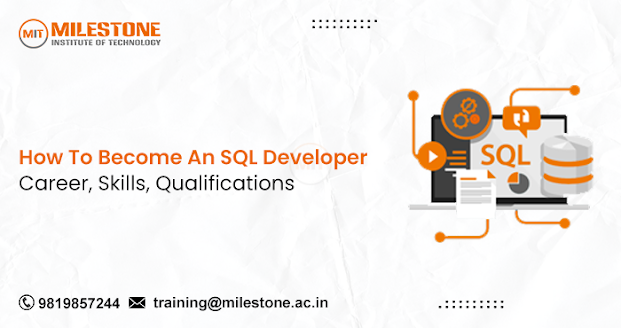How To Become an SQL Developer? Career, Skills, Qualifications
Understanding the Role of an SQL Developer
An SQL Developer is responsible for developing, managing, and optimizing SQL databases and applications. Their duties include:
Writing SQL queries to interact with databases.
Designing and implementing database structures.
Ensuring data integrity and security.
Optimizing database performance.
Collaborating with other developers and IT professionals to integrate databases with applications.
Educational Qualifications
While it’s possible to become an SQL Developer through various pathways, most employers prefer candidates with a solid educational background in computer science or a related field.
Bachelor’s Degree: Obtain a bachelor’s degree in Computer Science, Information Technology, or a related discipline. This foundational education will provide you with essential knowledge in programming, database management, and system design.
Specialized Courses and Certifications: Enhance your qualifications by taking specialized courses in SQL and database management. Certifications such as Microsoft Certified: Azure Data Engineer Associate, Oracle Database SQL Certified Associate, or IBM Certified Database Administrator can significantly boost your resume and demonstrate your expertise to potential employers.
Essential Skills for an SQL Developer
To excel as an SQL Developer, you need a combination of technical and soft skills:
Proficiency in SQL: Master the Structured Query Language (SQL), the standard language for relational database management. Learn to write complex queries, join tables, and use functions and stored procedures.
Knowledge of Database Management Systems (DBMS): Familiarize yourself with popular DBMS such as MySQL, Oracle, SQL Server, and PostgreSQL. Each system has its nuances, and understanding multiple systems will make you versatile.
Programming Skills: While SQL is crucial, knowledge of other programming languages like Python, Java, or C# can be beneficial, especially for integrating databases with applications.
Understanding of Database Design: Learn the principles of database design, including normalization, indexing, and data modeling. This ensures efficient and effective database structures.
Data Security and Privacy: In the current digital era, data security is crucial. Understanding encryption, user authentication, and data privacy regulations (like GDPR) is essential for protecting sensitive information.
Problem-Solving Abilities: SQL Developers often need to troubleshoot and solve complex database issues. Critical thinking and problem-solving abilities are essential.
Communication and Teamwork: Effective communication skills are necessary for collaborating with other developers, project managers, and stakeholders. Being able to explain technical concepts to non-technical team members is also important.
Gaining Experience
Practical experience is crucial in becoming a proficient SQL Developer. The following are some ways of obtaining practical experience:
Internships and Entry-Level Positions: Start with internships or entry-level positions that provide exposure to real-world database management scenarios. This hands-on experience is invaluable.
Personal Projects: Work on personal projects or contribute to open-source projects. Creating and managing your own databases can help you apply theoretical knowledge practically.
Freelancing: Offer your services as a freelancer on platforms like Upwork or Freelancer. This not only builds your portfolio but also exposes you to a variety of projects and industries.
Career Path and Advancement
The career path for an SQL Developer can be rewarding and offers various opportunities for advancement:
Junior SQL Developer: Starting your career, you will likely begin as a Junior SQL Developer, working under the guidance of senior developers and gaining experience.
Senior SQL Developer: With experience, you can progress to a Senior SQL Developer role, where you’ll take on more complex projects and may lead a team of developers.
Database Administrator (DBA): Some SQL Developers move into DBA roles, focusing on the administration and maintenance of databases, ensuring their performance, availability, and security.
Data Analyst or Data Scientist: With additional skills in data analysis and statistical modeling, you can transition to roles such as Data Analyst or Data Scientist, where you’ll use SQL to extract and analyze data to inform business decisions.
Staying Updated
The field of database management is continuously evolving. Keep yourself up to date with the most recent developments by:
Continuous Learning: Regularly take courses and attend workshops to keep your skills current.
Joining Professional Communities: Engage with professional communities, such as the SQL Server User Group or Oracle User Group, to network and learn from peers.
Reading Industry Publications: Follow industry blogs, journals, and publications to stay informed about new technologies and best practices.
Conclusion
Becoming an SQL Developer requires a blend of education, technical skills, and practical experience. With the increasing importance of data in every industry, the demand for skilled SQL Developers is set to grow, making it a promising career choice. By following the steps outlined above and continuously honing your skills, you can build a successful and fulfilling career as an SQL Developer.

.png)


Comments
Post a Comment